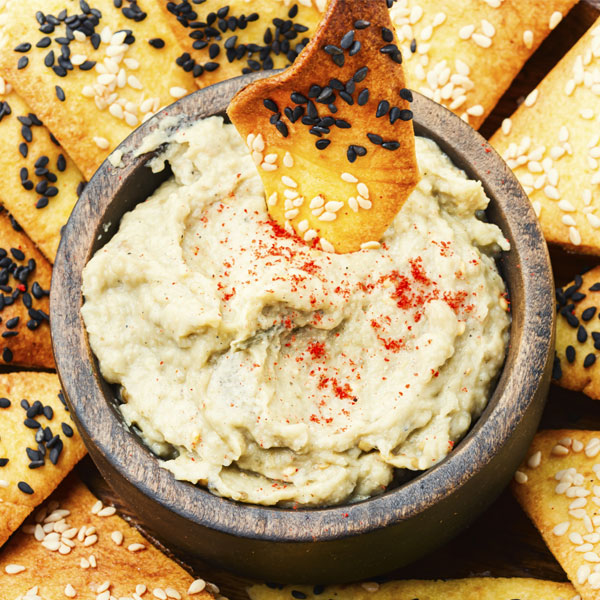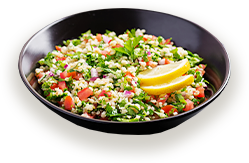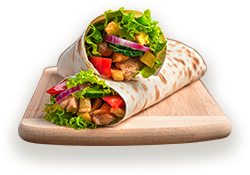The Largest Selection of Wholesale Mediterranean and Middle Eastern Products in Seattle
When it comes to trying new, exciting cuisine, few foods hit the spot like a deliciously fresh Mediterranean meal. However, we know that it can be very difficult to find authentic Mediterranean grocery wholesalers in Seattle, WA. Having lived in metro Atlanta for years, we realized that our customers needed an easy way to find quality wholesale Middle Eastern and Mediterranean food in bulk. That is why we created Nazareth Grocery Mediterranean Market - to give everyone a chance to enjoy tasty, healthy food, desserts, and authentic Mediterranean gifts at wholesale prices.
Founded in 2009, Nazareth Grocery has become one of Seattle's leading international wholesale grocery stores. We are very proud to serve our customers and do everything in our power to give them the largest selection of high-quality wholesale goods available.
If you're looking for the freshest, most delicious Middle Eastern wholesale products and ingredients, you will find them here at the best prices in the state. We encourage you to swing by our store in Marietta to see our selection for yourself. We think that you will be impressed!
The Nazareth Difference
At Nazareth Grocery Mediterranean Market, our mission is simple: bring you and your family the largest selection of wholesale Mediterranean products in Seattle. When coupled with our helpful, friendly staff and authentic Middle Eastern atmosphere, it's easy to see why we are the top Middle Eastern grocery wholesaler in Seattle, WA. We're proud to carry just about every kind of Mediterranean and Middle Eastern product that you can think of, from prepared meals and hookahs to fine seasonings and sweets. We're here for our customers and want each one of them to have a unique, one-of-a-kind experience when they shop with us.
Our loyal customers love our selection of the following wholesale foods and gifts:
 Fresh Breads
Fresh Breads Olives
Olives Hummus
Hummus Cheeses
Cheeses Sauces
Sauces Savory Foods
Savory Foods
 Desserts
Desserts Drinks
Drinks Hookahs
Hookahs Tobacco
Tobacco Gifts
Gifts Much More!
Much More!
- The Largest Selection of Wholesale Mediterranean
- The Nazareth Difference
- Most Popular Wholesale Mediterranean Foods
- Most Popular Wholesale Middle Eastern Foods
- Benefits of Eating a Mediterranean Diet
- Benefits of Eating a Mediterranean Diet Tips
- Why Buy Mediterranean and Middle Eastern Products Wholesale?
Our Service Areas
Most Popular Wholesale Mediterranean Foods
There is so much more to Mediterranean food than pizza and pasta. The perfect climate combined with delicious foods and amazing wine makes the Mediterranean incredibly irresistible. That's why our customers absolutely love to buy this kind of cuisine in bulk. Every country in this region has its own set of specialties and delicacies, each with its own flavors and styles of preparation.
Mediterranean countries include:
- France
- Greece
- Italy
- Turkey
- Syria
- Egypt
- Israel
- Libya
- Morocco
- Tunisia
- Spain

So, when it comes to the most popular wholesale Mediterranean products in Seattle,
what are we talking about?

Feta Cheese
Feta cheese is a classic Mediterranean dairy product that is often enjoyed on its own, in Greek salads, on bread, or mixed with zucchini. Depending on where the feta is sourced and produced, the cheese can be made from cow, sheep, or goat milk, or even a combination of the three. Regardless of the animal it comes from, this delicious cheese is a crowd favorite.

Baba Ganoush
This Levantine dish is one of the most well-known Mediterranean dishes to eat in the United States. It typically comes in the form of a dip, served with pita or another kind of dipping bread. Commonly served before dinner as an appetizer of sorts, it usually features tahini, eggplant, garlic, spices, and sometimes yogurt. This tasty cuisine works great as a spread on a sandwich, or you can even eat it with a spoon, all on its own.

Baklava
If you have never tried authentic baklava before, get ready to have your mind blown. This dessert is a traditional Mediterranean food that will have your taste buds craving more and more. Once you open a box of baklava from our Mediterranean grocery wholesaler in Seattle, WA, you won't want to stop eating! Baklava is made with layers of thin filo dough, which is layered together, filled with chopped nuts (think pistachios), and sealed with honey or syrup. Baklava is so good that its origins are debated, leaving many wondering which country invented the dessert. Everyone from the Turks to the Greeks and even Middle Easterners hold unique takes on baklava. Try each one to discover your favorite!
Most Popular Wholesale Middle Eastern Foods
Fresh, healthy, aromatic, rich: it's no wonder that the popularity of Middle Eastern cuisine and products has skyrocketed in the United States. This genre of cuisine features a large variety of foods, from Halvah to Labneh. If there were one common theme throughout all Middle Eastern food, it would be the bright, vibrant herbs and spices that are used. These flavorings help create rich, complex flavors that foodies fawn over. Typically, Middle Eastern food is piled high for all to eat, with enough food for an entire republic to put down.

Tabbouleh
This refreshing, healthy dish is chock-full of greens, herbs, tomatoes, and bulgur (or cracked wheat), creating a memorable, bold flavor. This dish may be eaten on its own or paired with a shawarma sandwich or helping of falafel. It's best to buy your ingredients in bulk to make this dish because it tastes best freshly made with family around to enjoy. Just be sure to bring a toothpick to the tabbouleh party - you're almost certain to have some leafy greens stuck in your teeth after eating.

Shawarma
We mentioned shawarma above, and for good reason - this dish is enjoyed by men and women around the world, and of course, right here in the U.S. Except for falafel, this might be the most popular Middle Eastern food item in history. Shawarma is kind of like a Greek gyro, with slow-roasted meat stuffed in laffa with veggies and sauce. The blend of spices and the smoky meat mix together to create a tangy, meaty flavor that you will want to keep eating for hours. For western-style shawarma, try using beef or chicken. For a more traditional meal, try using lamb from our Middle Eastern grocery distributor in Seattle, WA.

Hummus
Traditionally used as a dip meant for fresh pita, hummus is a combo of chickpeas, garlic, and tahini, blended together until silky, smooth, and creamy. You can find hummus in just about any appetizer section of a Middle Eastern restaurant menu. That's because it's considered a staple of Middle Eastern food that can be enjoyed by itself, as a spread, or with fresh-baked pita bread. Hummus is also very healthy, making it a no-brainer purchase from our grocery store.
Benefits of Eating a Mediterranean Diet
If there's one diet that is most well-known for its health benefits, it has got to be the Mediterranean diet. In 2019, U.S. News & World Report listed the Mediterranean diet as No. 1 on its best over diet list. This incredible diet has been cited to help with weight loss, brain health, heart health, diabetes prevention, and cancer prevention.
Whether you already love Mediterranean food or you're looking to make some positive changes in your life, this "diet" is for you. Eating cuisine like Greek food, Persian food, Turkish food, and Italian food is healthy and tastes great. Even better than that? At Nazareth Wholesale Grocery, we have many staples of the Mediterranean diet for sale in bulk so that you can stock up on your favorites at the best prices around.
So, what exactly is the Mediterranean diet?
It is a way of eating that incorporates traditional Greek, Italian, and other Mediterranean cultures' foods. These foods are often plant-based and make up the foundation of the diet, along with olive oil. Fish, seafood, dairy, and poultry are also included in moderation. Red meat and sweets are only eaten in moderation, not in abundance. Mediterranean food includes many forms of nuts, fruits, vegetables, fish, seeds, and more. Of course, you can find at them all at our wholesale Mediterranean grocery store!
Here are just a few of the many benefits of eating a healthy Mediterranean diet:

Reduced Risk
of Heart Disease
Many studies have been conducted on this diet, many of which report that Mediterranean food is excellent for your heart. Some of the most promising evidence comes from a randomized clinical trial published in 2013. For about five years, researchers followed 7,000 men and women around the country of Spain. These people had type 2 diabetes or were at a high risk for cardiovascular disease. Participants in the study who ate an unrestricted Mediterranean diet with nuts and extra-virgin olive oil were shown to have a 30% lower risk of heart events.

Reduced Risk
of Stroke for Women
In addition to the heart-healthy benefits of a Mediterranean diet, studies have shown that eating healthy Mediterranean and Middle Eastern foods can reduce the chances of stroke in women. The study was conducted in the U.K., which included women between the ages of 40 and 77. Women who stuck to the Mediterranean diet showed a lower risk of having a stroke - especially women who were at high risk of having one.
Benefits of Eating a Mediterranean Diet
First and foremost, purchase your Mediterranean and Middle Eastern wholesale foods from Nazareth Grocery - we're always updating our inventory! Getting started on this healthy, delicious diet is easy.
Try these tips:

1.
Instead of unhealthy sweets like candy and ice cream, try eating fresh fruit instead. It's refreshing, tasty, and often packed with great vitamins and nutrients.
2.
Try eating fish twice a week, in lieu of red meat. Fish is much healthier and doesn't have the unfortunate side effects of red meat, like inflammation.
3.
Try planning out your meals using beans, whole grains, and veggies. Don't start with meats and sweets.
4.
They're tasty, but try to avoid processed foods completely.
5.
Instead of using butter to flavor your food, use extra virgin olive oil instead. Olive oil contains healthy fats and tastes great too.
6.
Try to get more exercise and get out of the house. The Mediterranean lifestyle is an active one, best enjoyed in the beautiful sunshine when possible.
Why Buy Mediterranean and Middle Eastern Products Wholesale?
Buying wholesale and retail are quite different. When you buy products from a wholesaler, you're essentially buying from the middleman between a retail establishment and the manufacturer. Wholesale purchases are almost always made in bulk. Because of that, buyers pay a discounted price. That's great for normal buyers and great for business owners, who can sell those products to profit. This higher price is called the retail price, and it is what traditional customers pay when they enter a retail store.
Free Estimate
Latest News in Seattle, WA
Seattle to see frigid temps, icy roads for Friday morning commute
Brian MacMillanhttps://www.fox13seattle.com/weather/seattle-frigid-temps-icy-roads-friday
Seattle weather: Snow continues Monday morning, afternoon sunshine and thawingWe should dry out by the second half of the morning commute, with sunshine on tap for the second half of the day. Temperatures will warm again to the mid 30s, which should help melt any snow or ice on the main roads by midday.The BriefDrier and sunnier conditions return to western Washington on Thursday afternoon, but frigid temperatures overnight could ...
Seattle weather: Snow continues Monday morning, afternoon sunshine and thawing
We should dry out by the second half of the morning commute, with sunshine on tap for the second half of the day. Temperatures will warm again to the mid 30s, which should help melt any snow or ice on the main roads by midday.
The Brief
Drier and sunnier conditions return to western Washington on Thursday afternoon, but frigid temperatures overnight could complicate the Friday morning commute.
Overnight snow brought several inches of accumulation to central Puget Sound areas. The south Puget Sound was completely left out.
Here is a look at some of the 24-hour snow totals.
Dry and sunny in Seattle
By the numbers:
The area will get back to sunny skies on Thursday afternoon, which will promote melting and better road conditions on most of the main roads. Highs will be in the mid to upper 30s.
Clear skies Thursday evening will send temps plummeting into the low to mid 20s by early Friday morning. Anything that has not evaporated on the roads could freeze over, leading to a very slippery morning commute.
(FOX 13 Seattle)
More snow in Seattle on Friday night
What's next:
The chance for more lowland snow will pick up again from Friday night into Saturday morning as a low pressure system moves inland south of the area. Amounts will be lighter than Thursday morning’s event, but stay tuned to the forecast as we get closer.
This weekend will bring a slight chance for showers at times, but it looks more dry than wet.
We will remain very cool through the middle of next week with highs in the 30s and lows in the 20s.
(FOX 13 Seattle)
The Source: Information comes from weather models analyzed by FOX 13 Seattle Chief Meteorologist Brian MacMillan.
Seattle principal arrested for DUI and domestic violence after car flips
Japan Airlines plane impales tail of Delta plane at Sea-Tac Airport
More than 1K rally outside Olympia Capitol in '50 states, 50 protests' demonstration
Washington Senate passes changes to parental rights in education
Winter weather suspends garbage collection in Seattle, Bellevue
Kristina Moyhttps://www.fox13seattle.com/news/snow-halts-seattle-garbage-pickup
The BriefSEATTLE - Snow and icy road conditions on Thursday forced the suspension of residential garbage, recycling and food/yard waste pickup across Seattle and parts of Bellevue.Keep reading to find out if your garbage service is impacted and when collection will resume.Seattle garbage service suspendedService Suspended:Seattl...
The Brief
SEATTLE - Snow and icy road conditions on Thursday forced the suspension of residential garbage, recycling and food/yard waste pickup across Seattle and parts of Bellevue.
Keep reading to find out if your garbage service is impacted and when collection will resume.
Seattle garbage service suspended
Service Suspended:
Seattle Public Utilities announced that no residential collections will take place Thursday due to hazardous road conditions.
Residents with scheduled pickups should bring their carts inside and can set out double the usual amount of waste on their next collection day at no extra charge.
SPU’s North and South transfer stations are open at 10 a.m. Thursday. For the latest updates, residents are encouraged to check the At Your Service blog and follow SPU on X @SeattleSPU.
Bellevue garbage service impacted
What they're saying:
Republic Services, which provides waste collection in Bellevue, confirmed that service is suspended for Northeast Bellevue, Crossroads and Lake Hills on Thursday.
Impacted residents will receive direct notifications and will also be able to put out double the usual amount of waste on their next scheduled pickup day.
Snowfall impacts roads, flights, schools
Snowfall across western Washington Thursday morning created difficult travel conditions.
Several school districts announced closures and delays, flights at Sea-Tac Airport were canceled and thousands lost power. The Seattle Department of Transportation continues to plow and de-ice major roads, but steep and residential streets remain hazardous.
MORE NEWS FROM FOX 13 SEATTLE
Seattle principal arrested for DUI and domestic violence after car flips
Japan Airlines plane impales tail of Delta plane at Sea-Tac Airport
More than 1K rally outside Olympia Capitol in '50 states, 50 protests' demonstration
Washington Senate passes changes to parental rights in education
To get the best local news, weather and sports in Seattle for free, sign up for the daily Fox Seattle Newsletter.
Download the free FOX LOCAL app for mobile in the Apple App Store or Google Play Store for live Seattle news, top stories, weather updates and more local and national coverage, plus 24/7 streaming coverage from across the nation.
Japan Airlines Wing Slices into Delta Air Lines Tail at SeaTac Airport During Collision
Ingrid Vasquezhttps://people.com/japan-airlines-delta-air-lines-planes-collide-at-seattle-airport-8786751
A Japan Airlines plane collided with a Delta Air Lines flight on the tarmac at the Seattle–Tacoma International Airport on Wednesday, Feb. 5.Port of Seattle Fire, Police, and SEA operations responded to "an incident on the ramp at SEA on a taxi line between S Concourse and the south airport maintenance hangars" at approximately 10:17 a.m., the airport said in a ...
A Japan Airlines plane collided with a Delta Air Lines flight on the tarmac at the Seattle–Tacoma International Airport on Wednesday, Feb. 5.
Port of Seattle Fire, Police, and SEA operations responded to "an incident on the ramp at SEA on a taxi line between S Concourse and the south airport maintenance hangars" at approximately 10:17 a.m., the airport said in a social media update.
According to the Federal Aviation Administration (FAA), the right wing of Japan Airlines Flight 68 struck the tail of Delta Air Lines Flight 1921.
Video reviewed by PEOPLE showed a close-up of the wing of the Japan Airlines aircraft pierced into the tail of the Delta Air Lines aircraft. The plane was not traveling at high speed.
While the FAA said that both flights were taxiing at the time of the collision, the airport said that the Japan Airlines aircraft was taxiing and the Delta Air Lines aircraft was parked.
Delta Air Lines Flight 1921 was set to operate from Seattle to Puerto Vallarta with 142 passengers onboard. According to CBS News, the Japan Airlines plane had just arrived in Seattle from Tokyo.
"While in sequence for deicing, the tail of a Delta 737 aircraft reportedly made contact with a wing tip of another airline's aircraft. There are no reports of injuries for crew or customers on the flight, and we apologize for the experience and delay in travels," Delta Air Lines explained in a statement shared with PEOPLE.
According to the FAA, the aircraft were in an area not under air traffic control at the time of the incident.
The FAA temporarily paused some flights to the airport afterward. The airport said there was "minimal impact" to airport operations as this occurred on a taxi lane.
In an update later on Wednesday, Seattle–Tacoma International Airport said that passengers on both aircraft deplaned with no reported injuries.
"Airlines are working to accommodate passengers as needed. Airport response crews will be moving the aircraft off of the ramp taxiway," the update added.
PEOPLE has reached out to Japan Airlines for comment.
Never miss a story — sign up for PEOPLE's free daily newsletter to stay up-to-date on the best of what PEOPLE has to offer??, from celebrity news to compelling human interest stories.
The incident, which will continue to be investigated by the FAA, comes days after a Philadelphia plane crash left seven people dead, and a midair crash between an American Airlines flight and a U.S. Army Black Hawk helicopter over Washington, D.C left 67 people dead.
K-pop takes center stage: AESPA’s U.S. tour draws thousands in WA
Clint Edwardshttps://www.fox13seattle.com/news/aespa-tour-draws-thousands-wa
KENT, Wash. - K-pop powerhouse group, aespa, one of the top groups in the genre, took Washington by storm last week at the ShoWare Center in Kent.On January 28, members Winter, Karina, NingNing, and Giselle of aespa took the stage in front of thousands on their first visit to Washington since their debut in 2020 for their 2025 SYNK : PARALLEL LINE tour.While ...
KENT, Wash. - K-pop powerhouse group, aespa, one of the top groups in the genre, took Washington by storm last week at the ShoWare Center in Kent.
On January 28, members Winter, Karina, NingNing, and Giselle of aespa took the stage in front of thousands on their first visit to Washington since their debut in 2020 for their 2025 SYNK : PARALLEL LINE tour.
While Seattle is a major city in the U.S., it is skipped by a lot of K-pop groups for major tours, but aespa is following groups like SEVENTEEN, ENHYPEN, NCT DREAM, and (G)I-DLE taking over the state’s high-capacity arenas.
Fans of all ages attended the first tour stop dressed in outfits based on the group’s music videos and stage outfits, and some waited for hours outside ahead of the show.
The group performed over 20 of their hit songs, including the solo songs the members have released.
One song fans were most excited to hear was the most recent viral hit, "Whiplash."
The group pushed the song back towards the end of the set list, but fans in the crowd were on their feet doing the choreography in unison with the members to the end.
"My daughter and I are big aespa fans and we were so happy they came to the Seattle area on their tour. I always enjoy seeing K-pop concerts at accesso ShoWare Center," says fan Christine Hollett.
While many local fans wished the concert could have been held at a larger venue due to high demand, having the group visit the state at all was a win-win for most.
Some were able to get tickets last minute, like Dibyendu Mondal who said, "Loved the concert…and really appreciated that they released more tickets a couple hours before the concert and me and my friend were able to buy those and avoid the insane prices on resale websites."
Christine brought along two new fans of aespa to experience the fun for the first time.
"They had the best time and really enjoyed how good the performances by aespa were, and how engaged and excited the fans were. We were happy to meet some other friends from the K-pop community there," Christine says.
As Kent was their first stop on the U.S. leg of their tour, fans across the country were waiting to see the set list posted by attendees here.
FOX 13 attended the show alongside fans from all over the Pacific Northwest.
According to the venue, the show was sold-out with approximately 5,000 in attendance.
The overwhelming turnout in Washington highlights K-pop’s growing influence in the state, with the number of groups and solo acts increasing every year, most recently with solo artists KINO and YVES, and top K-pop boy group STRAY KIDS taking over T-Mobile Park on May 24.
Related
"Before I established my own company, I was looking for a good direction for my musical journey, and then I realized that there's no company that could take more risks than me, so I decided to run my own," KINO tells FOX 13.
This tour not only cements aespa’s status as a global powerhouse but also shows the continued growth of K-pop in the Pacific Northwest as fans continue to flock to shows here.
Following their stop in Washington the group performed in Los Angeles and Mexico City.
They have nine final stops in the U.S. and Europe rounding out the tour on March 12 in Madrid before heading back to Korea to continue their journey as chart-topping idols.
MORE K-POP NEWS FROM FOX 13 SEATTLE
IVE’s global reign continues: Group growth, viral hits, and 'IVE EMPATHY'
CIX returns after a year with "THUNDER FEVER," ushering in new, bold era
J-Pop Sensation PSYCHIC FEVER to light up Seattle’s Neptune Theatre
JUST B talks 2025 rebranding, upcoming tour and irreplaceable image
To get the best local news, weather and sports in Seattle for free, sign up for the daily Fox Seattle Newsletter.
Download the free FOX LOCAL app for mobile in the Apple App Store or Google Play Store for live Seattle news, top stories, weather updates and more local and national coverage, plus 24/7 streaming coverage from across the nation.
Disclaimer:


 770-795-9026
770-795-9026


